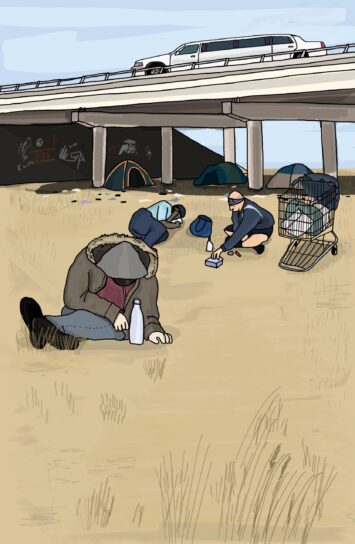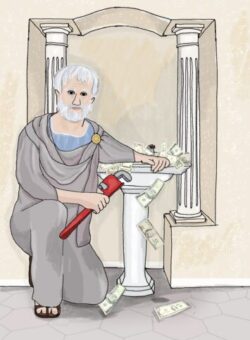1246 Two cousins meet for dinner
The Professor and the Plumber: Conversations About Equality and Inequality
by Eric W. Sager, with illustrations by Hanna Melin
Victoria: FriesenPress, 2021
$22.99 / 9781039105553
Reviewed by Jak King
*
 Many would argue that inequality is a defining characteristic of life in the early 2000s. More specifically — since some form of inequality has been part of human existence since our hunter-gatherer forebears mistakenly took the path toward “civilization” — it is the extraordinary growth in inequality (both economic and social) within my own lifetime that marks the present day as different in kind. But what does “equality” or “inequality” actually mean? How do we define those terms? And how, by gaining an understanding of the terms, can we construct a society that removes the stresses and tensions that inequality inevitably imposes? These are the important questions raised by Eric W. Sager of the University of Victoria in his brief treatise.
Many would argue that inequality is a defining characteristic of life in the early 2000s. More specifically — since some form of inequality has been part of human existence since our hunter-gatherer forebears mistakenly took the path toward “civilization” — it is the extraordinary growth in inequality (both economic and social) within my own lifetime that marks the present day as different in kind. But what does “equality” or “inequality” actually mean? How do we define those terms? And how, by gaining an understanding of the terms, can we construct a society that removes the stresses and tensions that inequality inevitably imposes? These are the important questions raised by Eric W. Sager of the University of Victoria in his brief treatise.
Structured in the form of a series of Socratic dialogues or conversations between a plumber and his cousin, an economics professor, Sager’s book goes a long way toward making a very complex debate understandable by overlaying each technical issue onto a real-life scenario.
The book begins with a description of two Canadians: one, a single mother who works in a warehouse for $20,000 a year, and a CEO making $11 million a year (said to be the average rate for a CEO in Canada). Obviously they represent two ends of the financial inequality scale. But Sager also notes that “they live in different worlds — and in different countries of the mind.”


The discussion then turns to the rise of extreme inequality in the present day. We know that back in the “good old days” of the 1950s, the average CEO made about 30 times the salary of the average employee. Today, that difference is 300 times or even greater. Sager more than adequately debunks the myth that somehow CEOs have become smarter over that period or that their jobs have become more complex. Instead, he suggests a range of reasons for the rapid increase in executive salaries including that the share of national income going to capital rose, while the share going to labour salaries and wages fell, the decline of trade unions and the welfare state, and “the increasing ability of CEOs to control their own pay.” He wraps these ideas into a brief discussion of the “free market cult” known as neoliberalism.

Sager makes the important point that such extreme inequality is not inevitable; it is in fact a choice made in North America: “Even where globalization and technological change have occurred, inequality is often lower than in Canada … In France, Sweden, and Japan, the share of the top 1% changed only slightly.”
Prof. Sager quotes research showing that in countries where inequality is greatest, trust is eroded, there is a greater risk of mental illness and drug use, homicides and suicides increase, infant mortality is lower, and social mobility is dampened. This leads to a conversation about the power of the money generated through inequality to warp democracy. This is seen not just in the power of big business and finance to lobby governments, but also in reduced participation in politics in countries with the greatest inequality, not to mention the rise of populism and “the revolt of the angry.” Inequality matters.
A later chapter discusses financial incentives and the professor effectively destroys the notion that they create productivity and growth. Noting that many people on the lowest level cannot work harder than they already are regardless of how much more you pay them, and remembering that CEOs who run companies into the ground still walk away with millions, he calls the system “a confidence trick … a scam.”

In the middle of the book, Sager begins to outline some possible solutions to what is clearly the crisis of extreme inequality in Canada. He touches on a guaranteed annual income (which generated much online discussion during the recent Federal election), fairer taxes, higher wages, a wealth tax on property, and several other proposals. But he declares them all to be “totally useless” without a reworking of our democracy into what he, quoting Thomas Piketty, calls “participatory socialism.”
There are several chapters that get into the nitty-gritty of supply and demand, economic modelling, the potential benefits of equality opportunity (which the current system denies us but which by itself would not be sufficient to deal with economic and social inequality), pay (in)equity, the establishment of private property as the probable progenitor of inequality, and the problems of fairness and justice. The conversationalists in the book also discuss utility functions, the welfare state, Amartya Sen’s approach to equalizing capabilities, behavioural economics, and the role of cooperative community. I had to read several of these chapters more than once to gain a reasonable appreciation of their meaning but they were certainly easier to understand than the standard economics textbooks.

In Sager’s final chapter, “An Equality Manifesto,” he pushes hard the notion that solutions come from ideas, and especially from ideas debated communally. He demonstrates that equality is not individual but communal, requires “accepting the presence of the other as necessary, essential to one’s own life and activity,” and that reciprocity is “the core value of community.” Mutual aid by any other name.
The great value of this generally accessible work is captured by Sager’s quotation from Epictetus: “Be careful to leave your children well instructed rather than rich, for the hopes of the instructed are better than the wealth of the ignorant.”
The Professor and the Plumber is a packed but slender text of just 125 pages, eighteen of which are illustrations by Hanna Melin. The latter are well done, both decorative and expository. The book does, however, come with an additional 25 pages of notes on sources including an invaluable reading list for those seeking further elaboration of this vital but tough topic.
*

Jak King is a neighbourhood activist, historian, and frequent commentator on Vancouver civic politics. Now retired, he is the author of The Drive, a history of Commercial Drive in East Vancouver from the 1930s to the 1950s, and Battleground Grandview: An Activist’s Memoir of the Grandview Community Plan, 2011-2016, a critique of recent urban planning in Vancouver. Editor’s note: See here for a review of Battleground: Grandview, by Jennifer Chutter; and here for a review by Ron Verzuh of a companion volume by Eric Sager, Inequality in Canada: The History and Politics of an Idea.
*
The Ormsby Review. More Books. More Reviews. More Often.

Publisher and Editor: Richard Mackie
The Ormsby Review is a journal service for in-depth coverage of B.C. books and authors. The Advisory Board consists of Jean Barman, Wade Davis, Robin Fisher, Cole Harris, Hugh Johnston, Kathy Mezei, Patricia Roy, Maria Tippett, and Graeme Wynn. Scholarly Patron: SFU Graduate Liberal Studies. Honorary Patron: Yosef Wosk. Provincial Government Patron since September 2018: Creative BC
“Only connect.” – E.M. Forster
2 comments on “1246 Two cousins meet for dinner”